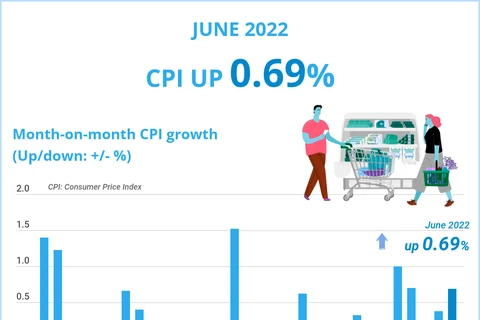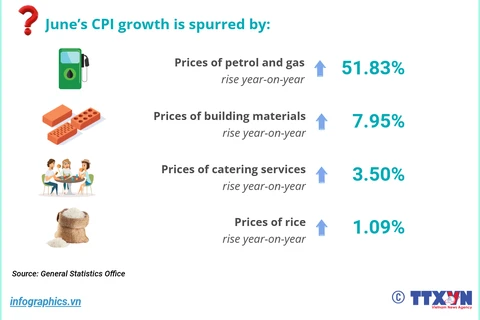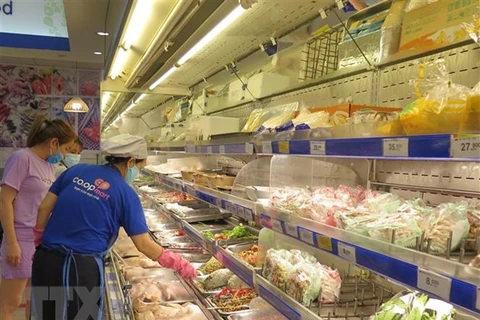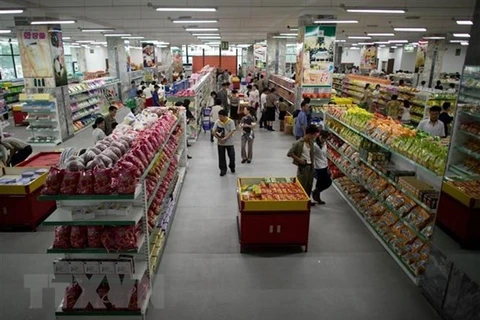Hanoi (VNA) - The average Consumer Price Index (CPI) of Vietnam in the first six months of this year increased by only 2.44% compared to the same period last year. This is attributable to the proactive efforts by the government to cope with the challenges caused by the increasing inflation pressure felt all over the world.
The June CPI increases by 0.69% against that in May and by 3.18% compared to that in December last year and rises by 3.37% from the same period last year. The constant rises of the domestic petroleum prices triggered the increase in the prices of fuel in the world market, worsened by the escalating prices of commodities and services as a result of the rising costs of inputs and transportation fees, which can be determined as the root causes of the hike.
The information was announced by Nguyen Thu Oanh, head of the Price Statistics Department under the General Statistics Department at a press conference held on June 29.
Inflation “accelerating” globally
The Q2 average CPI increased by 2.96% over the same period last year and the year’s six-month average, while it is 2.44% higher than last year, meaning the basic inflation stands at 1.25%.
Elaborating on the situation, Oanh pointed her finger to the many fluctuations in the world commodity market which underwent the impact of various economic and political factors. Concretely, the restoration of the global economy has created a hike in the demand for raw materials and other inputs in service of production while supply chains are still disrupted, and this has caused a strongly rising trend for the prices of commodities in the international market. That is not to say about the war between Russia and Ukraine which has by now further skyrocketed the prices of materials and fuels, and driven the whole world into the danger of facing a global food crisis.
Many countries have seen record inflations in May, such as the US with 8.6% compared to the same period last year and this is the highest since 1981. At the same time, the inflation in the Eurozone increases by 8.1% or four times the target of 2% set by the European Central Bank. In Asia, the inflation in Thailand is recorded at 7.1%, the Republic of Korea at 5.4%, Indonesia at 3.55%, Japan at 2.5%, and China at 2.1%, Oanh pointed out.
Prices controlled
In the country, the economy is restoring strongly. As a result, the demand for commodity production in service of consumption and export, together with the impact of the prices of commodities in the world, has sent the prices of essential commodities and services up but, generally speaking, the prices have basically been put under good control.
The official attributed the average CPI in the first six months of this year of only 2.44% to the proactive response by the government to the challenges caused by the increasing pressure of inflation.
The government has made a resolute direction on the ministries, sectors and localities, asking them to take concerted measures to stabilise prices to restrict adverse impacts on social and economic development, Oanh highlighted.
Policies have been rolled out promptly, helping stabilise the production and business of the firms as well as the life of the people, considerably easing the pressure on the prices. The policies include those on the value added tax levied on several groups of commodities from 10% down to 8% (from February 1), and the environment protection tax on aircraft fuel by 50% (from January 1 to the end of December 31), along with the reduction of 37 kinds of fees in the first six months of this year and the environment protection tax on petroleum starting from April 1 this year.
By now, the domestic prices are still under control but the inflation pressure for the rest of the year remains very considerable, the official said.
That is why the price management and control in the time to come should be conducted in a cautious, proactive and flexible way to ensure the reigning in of the average CPI rate for this year at about 4% as set by the National Assembly, Oanh concluded./.
























